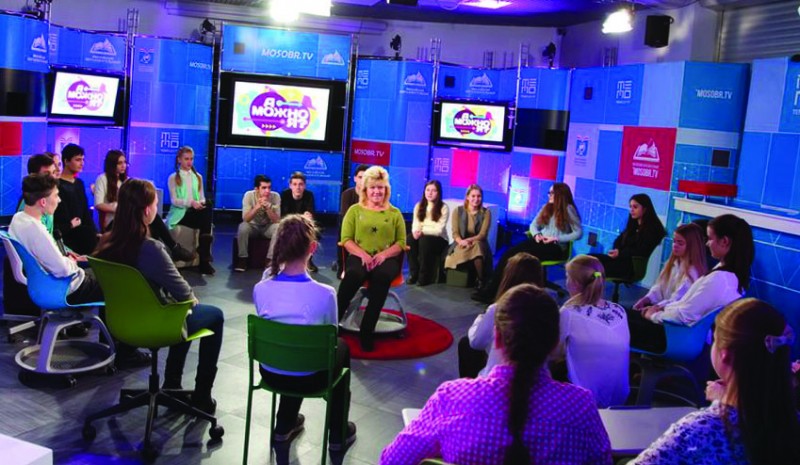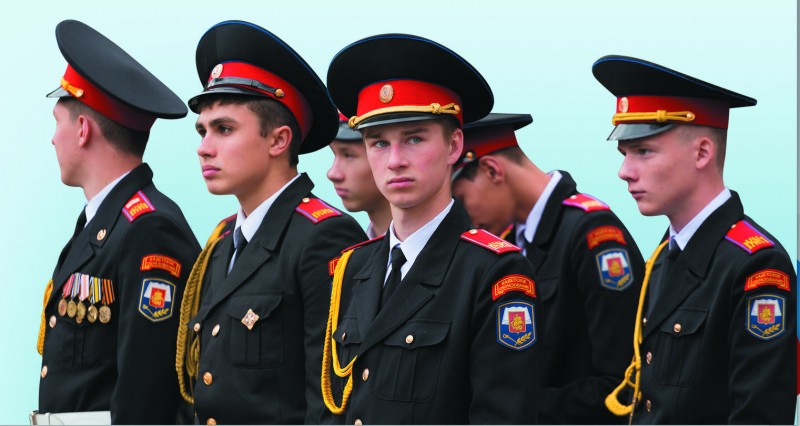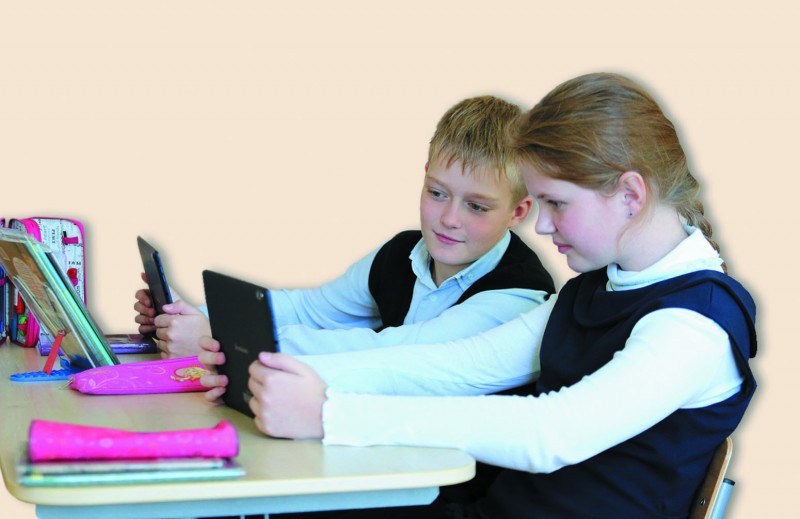MOSCOW INTERACTIVE
Do you watch any Video channels on the Net? If so, which one is your favourite and why?
Записать ответ
What do you know about “Moscow educational” Internet TV? Who is creating all the programmes of this channel?
 Listen and read to find out.
Listen and read to find out.
Moscow's school TV Stars

1. “Moscow educational” is an Internet TV channel which was founded in September, 2015. On the channel, you can find different educational programmes, media and resources. Its audience is large and includes everyone from pupils, parents, grandparents, teachers, headmasters and residents of other cities and towns in Russia. The arrangement of its programmes allows viewers to watch them at any convenient time. There are no adverts and you can enjoy interesting programmes without any interruptions.
2. Certainly, it is interesting to watch programmes on this channel, but it’s much more entertaining to take part in creating the programmes as well. The Children’s Television Educational Centre has been working in Moscow since 1995 to enable students to create their own TV programmes. The centre has everything needed to teach pupils how to make films: up-to-date filmmaking and mounting equipment, as well as studios and computer classes. At this centre, students, together with certified teachers, can create interesting stories, TV programmes, cartoons, clips and TV plays. Also, students can learn the basics of cinematography, photography, online journalism, computer editing and stage direction. What’s more, they learn how to work on stage and take part in talk-shows.
3. Some Moscow schools have opened their own TV studios as well. The students at these schools - the young reporters, hosts and editors - learn how to develop, film, edit and create video clips and programmes about their school life, teachers and classmates. Any news, interviews, documentaries, cartoons and music clips created by students are broadcast on “Moscow educational” Internet TV channel.
4. Students’ involvement in making TV programmes helps them develop their creativity and communication skills as well as gives them an idea of what TV journalism is about. These experiences help students choose their future profession more wisely.
To visit “Moscow educational” go to http://mosobr.tv/
Записать ответ
 Read the text again and match headings (A-E) to the paragraphs 1-4.
Read the text again and match headings (A-E) to the paragraphs 1-4.
A Students at work
B A popular innovation
C The benefits
D Internet resources {{}}
E A visit to a specialists’ centre
 In what ways do you think “Moscow educational” helps students? In three minutes write a few sentences. Tell the class.
In what ways do you think “Moscow educational” helps students? In three minutes write a few sentences. Tell the class.
 Collect more information about “Moscow educational”. Find information about the people who founded it, the schools that participate and any other interesting facts. Write an article about it for an international school magazine.
Collect more information about “Moscow educational”. Find information about the people who founded it, the schools that participate and any other interesting facts. Write an article about it for an international school magazine.
Look at the title of the text and the photo. Have you ever been there?
Записать ответ
Why is this place so special? In what ways is it the same or different now than in the past?
 Listen and read to find out.
Listen and read to find out.
The Eliseevsky Store
“Eliseevsky Store” company is one of the oldest trading
companies in Russia. In 1901 the Russian tradesman Grigory
Eliseev opened his first store in Moscow. After the revolution of
1917, the store continued to work as “Gastronome №1”. It
was no less popular than before. However, Muscovites
continued to call it “Eliseevsky”.
Today, the store keeps Grigory Eliseev’s traditions alive. It
daily serves more than 3,000 customers. You can find different
kinds of milk, sausages, meat and fish goods, cheese,
confectioneries, frozen products, fresh vegetables and fruit. All
its products go through quality control checks before they are
put on the shelves. Another feature of “Eliseevsky Store” that
is still present today is that it produces its own goods such as
fish and meat delicacies, pâté, salads, chocolates, cakes and
cookies, marmalades, truffles, and, of course, fresh bread.
In the luxurious neo-Baroque interiors of the store, the rich
assortment of food from Russia and abroad, as well as
souvenirs, are presented beautifully. The variety of pies, cakes
and exclusive handmade chocolate from the pastry shop is
huge. The cookery department offers ready-made dishes of
European, Asian and Russian cuisine. These include Moscovsky
borsch, “Boyarsky” salad, salted salmon, baked carp, chicken
rolls with prunes or cheese, marinated mushrooms and crispy
salted cucumbers. Likewise, the meat and fish department also
offers a variety of food. Foods like rabbit, tender sirloin,
Australian marble beef, entrecôtes, Prague and Balkan cutlets,
Mexican lamb with haricots, stuffed peppers, Polish cod,
Moldavian pike, perch, and sturgeon are all on sale here.
For “Eliseevsky Store” every customer is a guest. Each and
every employee tries to make sure that every customer leaves
the store with a smile. There is also a special loyalty programme for customers.
A lot of people visit “Eliseevsky” every day to do their shopping or just admire the amazing architecture. “Eliseevsky” is a superb example of Russia’s classic shops. 24 hours a day, 365 days a year “Eliseevsky” is here for everyone!
 Read the text again and answer the questions.
Read the text again and answer the questions.
1. When did “Eliseevsky Store” open?
2 When did it change its name?
3 Why do all the products go
through quality control checks?
4 In which department can you find marinated mushrooms?
5 What are the opening hours?
 What did you find most impressive in the text about “Eliseevsky Store”? Tell the class.
What did you find most impressive in the text about “Eliseevsky Store”? Tell the class.
Collect more information about the history of “Eliseevsky Store”. Find more differences between the store as it is today and the store as it was in the past. Present your work to the class.
Which is your favourite subject and why?
Записать ответ
What do some of the students in Moscow learn at school? How do their studies affect their future?
 Listen and read through to find out.
Listen and read through to find out.
I'm Honoured to Serve My Country!

Moscow students don’t just study school subjects like Maths and History, they learn how to serve their country! In almost every Moscow district, 8th grade pupils have the opportunity to study military science at cadet classes, which are an important part of the patriotic upbringing and education of the youth. They prepare children for military and public service.
Military education has many assets. Cadet classes have a 1) … (DISTINCT) feature which helps Moscow’s students develop important social skills. The cadets live, communicate, and study together with their peers. This way, they increase their 2) … (UNDERSTAND) of society and build strong 3)… (RELATE) which will last in time. The history of Russia is a compulsory subject in these classes and helps students get a thorough understanding of their country. This way, they gain deep 4) … (KNOW) of Russia’s past.
Moscow cadets are quite active. They take part in parades on Poklonnaya Gora and Red Square. Apart from that, they take part in regular 5) … (DISCUSS) on the forum “I’m Honoured to Serve My Country”. They also do physical exercises, go hiking and camping. What’s more, they volunteer for various activities and often help search for lost people. Moscow cadets do their best in everything they are 6) … (INVOLVE).
Moscow is proud of its youth and, likewise, they are proud of Moscow. The education they receive from their military training prepares them for the workplace and helps them decide what they want to do in the future.

 Form derivatives from the words in capitals so that they fit the text. Complete the gaps with the new words.
Form derivatives from the words in capitals so that they fit the text. Complete the gaps with the new words.
Moscow students don’t just study school subjects like Maths and History, they learn how to serve their country! In almost every Moscow district, 8th grade pupils have the opportunity to study military science at cadet classes, which are an important part of the patriotic upbringing and education of the youth. They prepare children for military and public service.
Military education has many assets. Cadet classes have a 1) (DISTINCT) feature which helps Moscow’s students develop important social skills. The cadets live, communicate, and study together with their peers. This way, they increase their 2) (UNDERSTAND) of society and build strong 3) (RELATE) which will last in time. The history of Russia is a compulsory subject in these classes and helps students get a thorough understanding of their country. This way, they gain deep 4) (KNOW) of Russia’s past.
Moscow cadets are quite active. They take part in parades on Poklonnaya Gora and Red Square. Apart from that, they take part in regular 5) (DISCUSS) on the forum “I’m Honoured to Serve My Country”. They also do physical exercises, go hiking and camping. What’s more, they volunteer for various activities and often help search for lost people. Moscow cadets do their best in everything they are 6) (INVOLVE).
Moscow is proud of its youth and, likewise, they are proud of Moscow. The education they receive from their military training prepares them for the workplace and helps them decide what they want to do in the future.
 What do you find most interesting about military training? Write a few sentences. Tell the class.
What do you find most interesting about military training? Write a few sentences. Tell the class.

 Collect more information about military education in Moscow and in another country. Compare the two. Present your work to the class.
Collect more information about military education in Moscow and in another country. Compare the two. Present your work to the class.
Do you like reading extracurricular books? What is your favourite type of books? How often do you visit your school/ local library? Is it easy to have access to libraries in your area?
Look at the title of the text and read the first paragraph. What do you expect to read about? What do you know about Ivan the Terrible?
 Listen and read to find out more.
Listen and read to find out more.
The Lost Library of Moscow
Nowadays, books aren’t expensive; you can buy them everywhere: at grocery stores, newsstands and street stalls. But, until the invention of typography in the 15th century, books were worth their weight in gold. They were copied by hand over centuries. The first material used to make books was papyrus (made from the leaves of papyrus plants), and later vellum (dried cow skin). Until books could be printed, collections of books were only available to the richest people. There are a lot of mysteries related to books. In Russia, the most mysterious story is the one about the library of Ivan the Terrible.
In 1472, Russian prince Ivan III married the Byzantine princess Sophia Palaeologus. As a wedding gift, she brought hundreds of ancient books, which had been collected for many centuries by Roman and then Byzantine emperors. Among the books she brought, there were works of ancient Greek and Roman poets and writers, as well as early religious texts.
In the 16th century, the ancient library passed into the hands of Queen Sofia’s grandson, Tsar Ivan IV, “the Terrible.” The Tsar added other books to the library: ancient Arabic books, books exported from Kazan, books collected by Yaroslav the Wise, and other Russian princes.
In Moscow, with its narrow streets and wooden houses, fires occurred regularly. Thus the Tsar, fearing for the safety of the priceless library ordered to hide it in a deep dungeon. People wrote at the time, “Books like a precious treasure were locked up in two vaulted cellars”. Only people loyal to the Tsar had access there.
But where those cellars are, is still a mystery. Hints of the location of the library were lost after Ivan’s death in 1584. During the reign of Peter I, people searched for the books in the dungeons under the Moscow Kremlin. Later on, there were many attempts to find the library: in Moscow, mostly under the Kremlin towers, and in Aleksandrovsky Kremlin where Ivan the Terrible moved to during the oprichnina (a state policy implemented by Tsar Ivan the Terrible in Russia between 1565 and 1572). They searched in Kolomenskoye and in Vologda where there were royal houses. Even Napoleon, who captured Moscow in 1812, tried in vain to find the famous library in vain.
Historians have made a lot of assumptions about the place where the library might be. There were reports that the library had finally been found, but they were false. There were people who dedicated their lives to the search for the library. But centuries have passed and the library remains unfound. Nowadays, the search continues. Scientists don’t lose hope and keep hypothesising while writers give their own explanations in adventure and science fiction novels. The outstanding scholar of the old Russian literature - Dmitry Likhachev - gives the following advice: “Instead of fruitless searches we should try and save existing book treasures which need to be studied, restored and preserved.”
 Read the text again and put the events (A-J) in the correct order.
Read the text again and put the events (A-J) in the correct order.
|
A. The Queen’s grandson inherits the library |
|
|
B. People search for the library under the Kremlin. |
|
|
C. The library is hidden underground. |
|
|
D. Ivan III marries a princess. |
|
|
E. Writers and scientists offer their explanations |
|
|
F. The Tsar died in 1584. |
|
|
G. Sophia Palaeologus brings many books to Russia. |
|
|
H. A Russian scholar suggests we should focus on the books we have |
|
|
I. Tsar Ivan IV adds many ancient books to the library |
|
|
J. A French general searches for the library. |
 Say three things you have learned from the text.
Say three things you have learned from the text.

 Collect information about other mysteries related to Moscow. Write a short text. Present it to the class.
Collect information about other mysteries related to Moscow. Write a short text. Present it to the class.
Have you decided what job to do in the future? If so, who helped you make that decision? If not, what are your thoughts about it?
How do colleges in Moscow help students find their future profession?
 Listen and read to find out.
Listen and read to find out.
Moscow colleges
What profession should you choose? One day every pupil has to
answer this question. Now, the choice may seem difficult, but it
doesn’t have to be. You can either go to university or get professional education.
1. In Moscow, there are 55 colleges which specialise in vocational
education. These colleges run training programmes for 64 professions and 110 occupations. This means that about 80,000 people study at Moscow vocational education centres every year and even take part in competitions. In 2016, during the 4th national “Young Professionals” championship, Moscow’s team won first overall prize by winning 15 gold, 13 silver, 11 bronze medals as well as 6 medals for professionalism.
2. Moscow colleges have much to offer their students. There is up-to-date equipment in every institution. What’s more – in collaboration with Moscow enterprises – they provide practical training according to the employers’ needs. In addition, they organise motivational and career-oriented activities for students to introduce them to as many career options as possible.
3. There’s a reason why college graduates are in great demand in Moscow’s workplace. Each college has its own employment assistance service which – in cooperation with employment centres – provides information about vacancies and internships to students. Moreover, many college websites have special sections where students can find information about careers, exhibition announcements, job fairs and other similar events.
4. Moscow has taken more steps to help young people find the right job. In 2016, the Employment Centre for the Youth was opened in Moscow. It aims to help young people without any work experience find work and develop their potential. Plus, it organizes job fairs and gives legal advice.
5. Today, every specialty is in demand in Moscow. For example, 400,000 people work in factories in Moscow and this number may rise in the future. Furthermore, with a growing demand for hotels and tourist businesses, the demand for qualified specialists has also increased. The rapid growth of Moscow also means that science and technology are an important part of this development. To meet this shortage, it is important that more and more young professionals be trained every year to meet the needs of the future. The future’s bright, for those who get vocational training.

 Read the text again and match the headings with the paragraphs. There is one extra heading. Justify your answers.
Read the text again and match the headings with the paragraphs. There is one extra heading. Justify your answers.
|
A. MORE JOBS FOR FUTURE GENERATIONS |
|
|
B. JOB OPPORTUNITIES AT SCHOOLS |
|
|
C. FACTS IN NUMBERS |
|
|
D. WHAT TO STUDY |
|
|
E. SCHOOLS WITH A DIFFERENCE |
|
|
F. A NEW ORGANISATION |
 What opportunities do students in Moscow colleges have? How can they decide what job to do? Tell the class.
What opportunities do students in Moscow colleges have? How can they decide what job to do? Tell the class.

 Imagine you work as a career counsellor to a centre for students. Collect more information about a specific college in Moscow. Find out about: subjects, activities, workshops, services, equipment and facilities. Give a short talk to present this college to students who want to enrol.
Imagine you work as a career counsellor to a centre for students. Collect more information about a specific college in Moscow. Find out about: subjects, activities, workshops, services, equipment and facilities. Give a short talk to present this college to students who want to enrol.
Where do you usually make new friends? How many of your friends did you first meet at school?
What is the right behaviour towards a new student in your class?
 Listen and read to find out.
Listen and read to find out.
Helping a new student in class

When a new student comes into class it can be an important event, not just in the life of the class, but also in the life of the student. At first, the desire to “examine” the newcomer is strong and students will look with interest and caution at the new student. Then, they will get to know their new classmate. They will, at some point, decide if they want to accept them into their group or not. For the newcomer, this can be a very stressful situation. So, if a new student comes into your class it is important that you help them settle in and adapt to their new environment.
Tips for the teacher:
• Before you introduce any new students to the class, talk to them, find out what they like, what their favourite subjects are. If a student is shy and doesn’t like to talk about themselves, don’t overdo it. Give them a questionnaire that they can fill in silently.
• Talk to the newcomer’s parents to find out how their child studied and communicated at the previous school.
Tips for the class:
• Let newcomers know that they aren’t alone and can always ask for help.
• Offer to sit at the same desk with a new student.
• Tell them where the library, the canteen and the sports hall are.
Tips for the newcomer:
• Try to talk to other students and remember their names.
• Don’t be afraid to take part in different activities or express yourself.
• If you feel uncomfortable, you can always ask for a teacher’s help.
• In modern Moscow schools, there are psychological support services. You can learn about them on your school’s official website or from the teacher.
A new school means new opportunities, new challenges and new meetings. Today, Moscow schools can satisfy the educational and sports needs of all their students as well as their need to be creative. It is important that the schools follow the same standards and requirements. So, when students transfer to a different school, if they need any kind of support, help will always be on hand to make it easy for them to adapt to their environment. At Moscow schools help will always be given to those who need it.
 Read the text again and decide if the statements are T (true) or F (false).
Read the text again and decide if the statements are T (true) or F (false).
|
1 Most pupils want to check out their new classmate. |
|
|
2 A new pupil will feel comfortable about that. |
|
|
3 A teacher should ask a lot of questions to find out more about the personality of the new pupil. |
|
|
4 Students must make a newcomer feel comfortable by letting them sit on their own. |
|
|
5 It is helpful if students explain to a newcomer where each place is in the school. |
|
|
6 A new pupil shouldn’t take the initiative to start a conversation. |
|
|
7 A new pupil should join sports groups. |
 Read the text again. Which of the tips in the text do you find the most helpful and why? Tell the class.
Read the text again. Which of the tips in the text do you find the most helpful and why? Tell the class.

 Do some Internet research about students’ behaviour towards newcomers. Write down the best tips you can find. Present your work to the class.
Do some Internet research about students’ behaviour towards newcomers. Write down the best tips you can find. Present your work to the class.